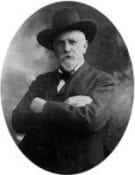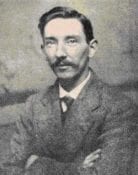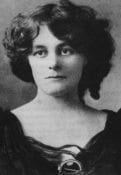“An Gorta Mór: A Fenian Ballad”
AN GORTA MóR / THE GREAT HUNGER: A Fenian Ballad (adapted from a traditional tune, lyric attributed to Jeremiah O’Donovan Rossa) (Christy O’Leary)
Come all ye brave young Irishmen, who’d right your country’s wrong,
I’ll sing to you a verse or two which won’t detain you long:
In old Iveleary-by-the-Hills my youthful days passed by;
The Famine came and filled the graves, I saw my father die….
The bailiff with the “notice” came – the bit of ground was gone–
I saw the roof-tree in a flame – the crow-bar work was done.
With neither house nor bed nor bread, the Workhouse was my doom,
And on my jacket soon I read: “The Union of Macroom.”
My mother died of broken heart; my uncle from the town
Brought for her a horse and cart and buried her in Gleown.
I joined the “Red Coats” then – mo leir! What would my father say?
And I was sent in one short year on service to Bombay….
Back in this sinking isle again, where vultures drink our blood,
Friends are scattered, starved or slain – I’m told I’m cursed by God,
How can it be by God’s decree I’m cursed, outlawed and banned
Because I swore, one day, to free my trampled Native Land?”

“Kilmainham Gaol, A Celtic Air”
(an original air by Richard B. Evans, commissioned by Síle de Valera, Minister of the Arts, Heritage, Gaeltacht & the Islands in 1999) (The Irish Ensemble & The Rising Concert Orchestra)
“The Gaelic Revival, Part 1”
Slán Le Máigh (Irish Gaelic Lyric by Aindreas Mac Craith) (Sung in Irish by Muireann nic Amhlaoibh. English translation here)
A hundred farewells from this place I’m in, Beside Maigue of the berries, the branches, the stacks
The estates, the jewels, the craftsmen, the crowds, The arts, the stories, the good-humored warriors.
Refrain (after each verse):
Oh it is ill I am, Without a share, or right, or company, or money, Without happiness, or jewels, or sport, or vitality.
Farewell forever to her happy freeman, To her love of kin, her gatherings, her clergy, her scholars,
To the friends of my heart, not perverse or deceitful, Without flaw, without concealment, without gluttony, without stinginess.
Good-bye, one by one, to its beautiful women, To their fame, their sense, their loveliness, their complexions,
To all its women, to their rank, their visitations, Their messing, their discussions, their minds and their talents.
“Renunciation”
RENUNCIATION (Poem by Pádraig Pearse, 1915) (Derek Ryan)
Naked I saw thee, O beauty of beauty, And I blinded my eyes for fear I should fail.
I heard thy music, O melody of melody, And I closed my ears for fear I should falter.
I tasted thy mouth, O sweetness of sweetness, And I hardened my heart for fear of my slaying.
I blinded my eyes, and I closed my ears, And I hardened my heart, and I smothered my desire.
I have turned my back on the vision I had shaped And to this road before me I have turned my face.
I have turned my face to the deed that I see And the death I shall die.

(1879-1916)
“Sergeant William Bailey”
THE RECRUITERS: Sergeant William Bailey (a new arrangement of a song by Peadar Kearney) (The Celtic Choir)
Too-ra-loo-ra-loo-ra-loo-ra-loo, Too-ra-loo-ra-loo-ra-loo-ra-loo.
Sergeant William Bailey was a man of high renown, In search of gallant young recruits he used to scour the town;
His face was full and swarthy, of medals he had forty, And ribbons on his chest red white and blue;
It was he that looked the hero as he made the people stare-O, As he stood on Dunphy’s corner too-ra-loo.
Too-ra-loo-ra-loo, Too-ra-loo-ra-loo, Too-ra-loo-ra-loo-ra, There’s Whiskey in the Jar.
But alas for human greatness every dog he has his day, And Sergeant William Bailey he is getting old and grey;
No longer youths are willing to take his dirty shilling, And things for him are looking mighty blue;
In spite of fife and drumming no more recruits are coming For Sergeant William Bailey too-ra-loo.
Sergeant William Bailey what a wretched sight to see, His back that once was firm and straight is almost bent in three;
Some rebel youths with placards have called his army blackguards And told the Irish youth just what to do;
He has lost his occupation, let’s sing in jubilation, Hallelujah, Hallelujah! Sing in jubilation For Sergeant William Bailey too-ra-loo!
Sing too-ra-loo-ra-loo, Sing too-ra-loo-ra-loo,
For Sergeant William Bailey too-ra! Whack fol de daddy-O, There’s Whisky in the Jar.

“The Famine Queen”
QUEEN VICTORIA’S VISIT TO IRELAND: The Famine Queen (from an article by Maud Gonne, 1900) (Esther Heideman, The Celtic Choir)
. . . Taking the Shamrock in her withered hand, she dares to ask Ireland for soldiers — for soldiers to fight for the exterminators of their race! And the reply of Ireland comes sadly but proudly, not through the lips of the miserable little politicians who are touched by the English canker, but through the lips of the Irish people:
“Queen, return to your own land; you will find no more Irishmen ready to wear the red shame of your livery. In the past they have done so from ignorance, and because it is hard to die of hunger when one is young and strong and the sun shines, but they shall do so no longer.
See! Your recruiting agents return alone and unsuccessful from my green hills and plains, because once more hope has revived, and it will be in the ranks of your enemies that my children will find employment and honour.”

(1866-1951)
“When You Are Old and Grey”
An additional track included on the CD-set, not performed within the concert program.

(1865-1939)


